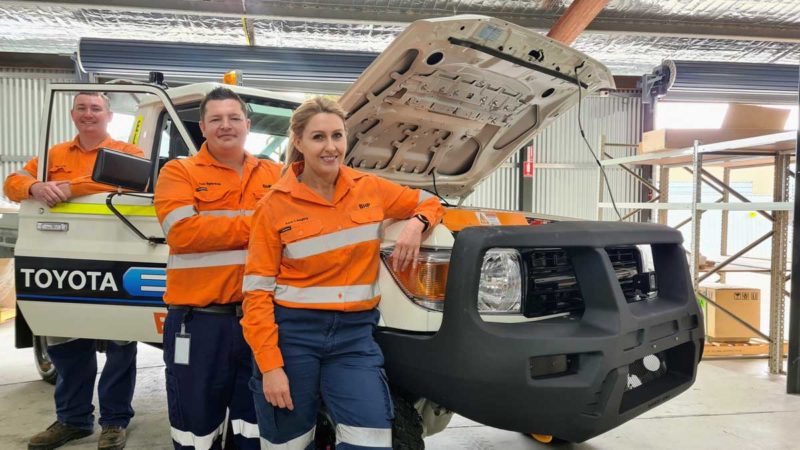Anglo-Australian mining giant BHP will partner with Toyota Australia on a trial of a new light electric vehicle (LEV) at its Nickel West operations in Western Australia.
BHP announced last week that a converted LandCruiser 70 – which now runs as a fully electric vehicle thanks to an onboard battery – will be trialled at its Nickel West operations, fulfilling several roles at the site and operating in both above ground and underground settings.
The move builds on previous trials undertaken by BHP with other suppliers that are currently ongoing at its Olympic Dam operations in South Australia and its Broadmeadow operations Queensland.
“This partnership is another step in our ongoing studies into how we can reduce the emissions intensity of our light vehicle fleet,” said Edgar Basto, BHP’s President of Minerals Australia.
“It builds on other LEV trials underway in South Australia and Queensland. Reducing our reliance on diesel at our operations will help achieve our medium-term target of reducing operational emissions by 30 per cent by 2030.”
The trial is expected to deliver immediate benefits to Nickel West operations.
“We anticipate seeing a reduction in fuel and maintenance costs, in addition to a reduction in noise, heat, and diesel particulate matter,” explained Eddy Haegel, BHP’s Asset President of Nickel West.
“The battery in the Toyota EV Landcruiser also contains a high proportion of nickel. With Nickel West being both a battery raw material producer and consumer in the electric vehicle market, it is a terrific opportunity to support Toyota with their understanding and development of electric vehicles for the mining industry, whilst also reducing the carbon footprint from our own nickel operations.”
Toyota Australia sees the partnership with BHP as an important next step in the company’s efforts to further a zero-emissions future.
“BHP and Toyota have demonstrated a strong relationship throughout the last 20 years, and this project is a great testament to how we can both work together as leading companies in our respective industries to change the future,” said Matthew Callachor, President and CEO of Toyota Australia.
The early-January announcement follows hot on the heels of several Toyota announcements similarly intended to bolster the company’s zero-emissions credentials.
Toyota announced in early December that it would finally be introducing its first battery-electric SUV, a mid-sized vehicle that will use an electric version of the company’s Toyota New Global Architecture (TNGA) platform. Already being prepared for manufacture, the vehicle nevertheless did not have a name to accompany its announcement.
Several days later, Toyota launched a “completely redesigned” 2021 Mirai fuel cell electric vehicle (FCEV) which it will launch in Australia sometime this year.
Toyota finished the year off by announcing that it will introduce in 2021 a solid-state battery that can recharge to full in just 10 minutes, a move which is being touted as a potentially revolutionary shakeup of the battery electric vehicle market.
Solid-state batteries are widely seen as a holy grail for battery electric vehicles, which currently remain tainted by the stigma of long recharge times, hampering wholesale uptake. By reducing recharge times, solid-state batteries could help bridge that the last barrier to entry – though the cost will remain an issue for as long as battery technology remains at its current prices.
Joshua S. Hill is a Melbourne-based journalist who has been writing about climate change, clean technology, and electric vehicles for over 15 years. He has been reporting on electric vehicles and clean technologies for Renew Economy and The Driven since 2012. His preferred mode of transport is his feet.

